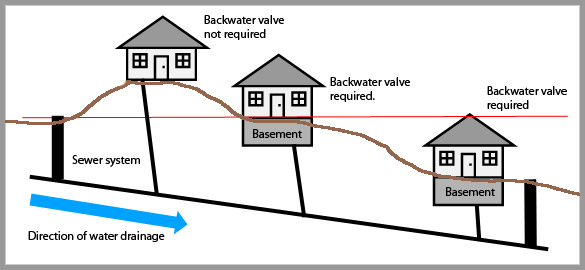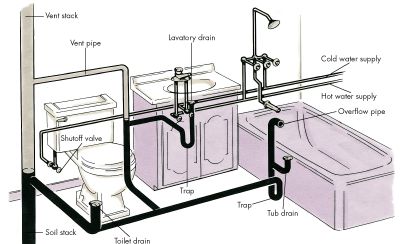Breaking Down Your House's Plumbing System Anatomy
Breaking Down Your House's Plumbing System Anatomy
Blog Article
What are your ideas regarding Plumbing Installation 101: All You Need to Know?

Recognizing exactly how your home's plumbing system works is necessary for each home owner. From delivering clean water for drinking, cooking, and showering to securely eliminating wastewater, a well-maintained plumbing system is vital for your family's health and wellness and convenience. In this extensive overview, we'll discover the complex network that makes up your home's plumbing and offer ideas on upkeep, upgrades, and dealing with typical concerns.
Introduction
Your home's pipes system is greater than simply a network of pipes; it's a complex system that guarantees you have accessibility to clean water and efficient wastewater removal. Recognizing its parts and how they work together can help you stop expensive repairs and guarantee whatever runs efficiently.
Standard Elements of a Pipes System
Pipes and Tubing
At the heart of your pipes system are the pipes and tubing that bring water throughout your home. These can be constructed from numerous materials such as copper, PVC, or PEX, each with its advantages in terms of longevity and cost-effectiveness.
Components: Sinks, Toilets, Showers, and so on.
Components like sinks, commodes, showers, and bathtubs are where water is used in your home. Comprehending exactly how these fixtures connect to the plumbing system helps in identifying issues and preparing upgrades.
Valves and Shut-off Points
Valves control the flow of water in your plumbing system. Shut-off valves are crucial during emergencies or when you require to make fixings, permitting you to separate parts of the system without interfering with water circulation to the whole home.
Water System
Key Water Line
The major water line attaches your home to the metropolitan supply of water or an exclusive well. It's where water enters your home and is dispersed to various components.
Water Meter and Stress Regulator
The water meter measures your water usage, while a pressure regulatory authority makes sure that water flows at a safe stress throughout your home's plumbing system, avoiding damage to pipelines and fixtures.
Cold Water vs. Hot Water Lines
Recognizing the distinction in between cold water lines, which provide water straight from the main, and warm water lines, which carry warmed water from the hot water heater, helps in repairing and planning for upgrades.
Water drainage System
Drain Piping and Traps
Drain pipes carry wastewater far from sinks, showers, and toilets to the sewage system or septic tank. Catches prevent sewage system gases from entering your home and also catch debris that can cause clogs.
Air flow Pipes
Air flow pipes permit air into the water drainage system, preventing suction that might slow water drainage and cause traps to vacant. Proper air flow is crucial for keeping the integrity of your pipes system.
Significance of Correct Drain
Ensuring proper water drainage avoids back-ups and water damages. On a regular basis cleaning drains pipes and keeping traps can protect against expensive fixings and extend the life of your pipes system.
Water Heating System
Sorts Of Water Heaters
Hot water heater can be tankless or typical tank-style. Tankless heating units warmth water as needed, while storage tanks keep heated water for instant usage.
Upgrading Your Plumbing System
Factors for Updating
Upgrading to water-efficient fixtures or changing old pipes can enhance water high quality, lower water costs, and increase the value of your home.
Modern Plumbing Technologies and Their Benefits
Explore innovations like wise leakage detectors, water-saving commodes, and energy-efficient water heaters that can save cash and reduce environmental impact.
Expense Factors To Consider and ROI
Compute the ahead of time prices versus lasting financial savings when considering plumbing upgrades. Many upgrades pay for themselves through decreased utility bills and fewer repair services.
Exactly How Water Heaters Link to the Plumbing System
Comprehending exactly how water heaters link to both the cold water supply and hot water distribution lines assists in identifying issues like inadequate hot water or leakages.
Upkeep Tips for Water Heaters
Regularly flushing your water heater to remove sediment, checking the temperature setups, and checking for leaks can prolong its lifespan and improve power performance.
Typical Plumbing Issues
Leakages and Their Reasons
Leaks can happen due to aging pipes, loosened installations, or high water pressure. Dealing with leaks quickly prevents water damages and mold development.
Blockages and Obstructions
Clogs in drains and commodes are usually triggered by flushing non-flushable items or a buildup of oil and hair. Making use of drain screens and bearing in mind what goes down your drains pipes can protect against blockages.
Indications of Plumbing Troubles to Look For
Low water pressure, slow-moving drains pipes, foul odors, or unusually high water bills are indicators of prospective plumbing problems that should be resolved immediately.
Plumbing Upkeep Tips
Routine Inspections and Checks
Set up yearly plumbing inspections to capture issues early. Seek indications of leaks, deterioration, or mineral buildup in taps and showerheads.
DIY Upkeep Tasks
Simple jobs like cleaning tap aerators, checking for toilet leakages using color tablets, or protecting exposed pipes in cool environments can avoid significant plumbing issues.
When to Call an Expert Plumbing
Know when a pipes problem calls for expert proficiency. Trying complex repair services without proper understanding can lead to even more damage and higher fixing costs.
Tips for Minimizing Water Usage
Easy habits like taking care of leakages quickly, taking much shorter showers, and running complete loads of washing and recipes can preserve water and lower your utility expenses.
Eco-Friendly Pipes Options
Think about lasting pipes products like bamboo for floor covering, which is durable and environmentally friendly, or recycled glass for kitchen counters.
Emergency Preparedness
Steps to Take Throughout a Pipes Emergency
Know where your shut-off shutoffs lie and how to shut off the water system in case of a ruptured pipe or major leakage.
Relevance of Having Emergency Get In Touches With Helpful
Maintain call information for local plumbing professionals or emergency services easily offered for fast feedback during a plumbing crisis.
Environmental Effect and Preservation
Water-Saving Components and Devices
Installing low-flow faucets, showerheads, and commodes can substantially minimize water use without giving up efficiency.
Do It Yourself Emergency Situation Fixes (When Relevant).
Short-lived fixes like utilizing air duct tape to spot a dripping pipe or putting a container under a trickling tap can decrease damage up until an expert plumbing technician shows up.
Final thought.
Recognizing the makeup of your home's pipes system equips you to preserve it successfully, saving time and money on repairs. By complying with regular maintenance regimens and remaining notified regarding modern pipes technologies, you can guarantee your pipes system operates efficiently for years ahead.
Understanding Your Home Plumbing System: A Comprehensive Guide
Plumbing System: The Lifeline of Your Home
At its core, the plumbing system is designed to perform two primary functions: bring fresh water into your home and remove wastewater. The system is a network of pipes, fixtures, and other components that transport water and sewage. Residential plumbing systems include potable water supply lines, drain-waste-vent (DWV) systems, and various plumbing fixtures that make water use in daily tasks possible.
Key Components:
Water Supply: This part of your plumbing system brings municipal water into your home, passing through the main water supply line. It s responsible for supplying all water needs, from drinking to bathing.
Drainage System: It carries waste and water away from your home to the sewer or septic system. This system includes all the piping within your home that leads to external sewage or septic systems.
Vent System: An essential yet often overlooked component, the vent system allows sewer gases to escape and lets air into the drainpipes, ensuring water and waste move correctly through the system.
Fixture: More Than Just Taps and Toilets
Plumbing fixtures are the most interactive parts of the plumbing system, including faucets, showers, toilets, and sinks. Each fixture is connected to the plumbing system and plays a role in either the delivery of freshwater or the disposal of waste and wastewater.
Types of Fixtures:
Faucets and Sinks: Used for washing hands, dishes, and other daily water needs. Toilets: Dispose of human waste through the sewage system. Bathtubs and Showers: Provide bathing facilities, requiring both hot and cold water supply. Water Supply: The Source of Life
The water supply system is a critical component, ensuring that potable water is available throughout your home for various uses, including drinking, cooking, and cleaning. This system consists of pipes that distribute water to different parts of the house, controlled by valves to regulate the water flow.
Types of Plumbing: Materials and Methods
Various types of plumbing systems and materials are used in residential settings, each with its advantages and applications. From copper and PVC pipes for water supply to cast iron and ABS for drainage, the choice of materials can impact the longevity and efficiency of your plumbing system.
https://intownplumbingtx.com/articles/home-plumbing-system-guide/

We hope you enjoyed reading our section about The Inner Workings of Your Home's Plumbing. Thanks a ton for finding the time to read through our posting. Are you aware of anybody else who is interested in the topic? Take a moment to share it. Thanks for your time. Kindly come visit our site back soon.
Click Here To Find Out More Report this page